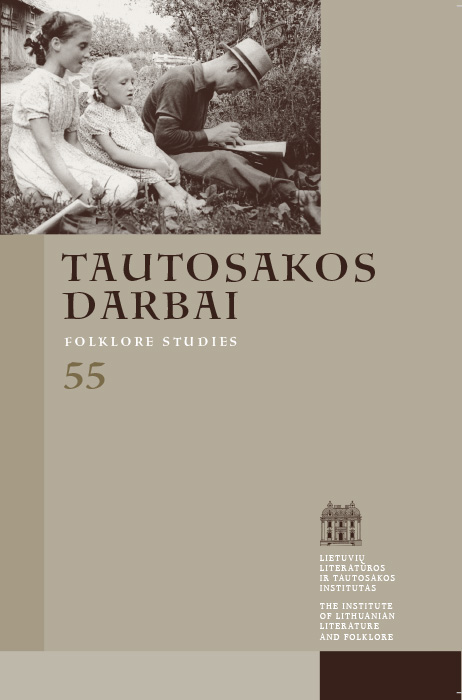Balsas truba swieta judins, ir numirusius pabudins: malda su pučiamaisiais instrumentais liaudiškojo pamaldumo tradicijoje
Santrauka
A. Šiaurės vakarų Žemaitijos miestelių, bažnytkaimių kapinėse vasarą vykstančiuose atlaiduose vis dar galima išvysti prie kapo kartu su artimaisiais besimeldžiančius ir giesmių melodijas grojančius dūdorius. Straipsnio tikslas – išnagrinėti mokslininkų iki šiol visiškai netirtą reiškinį – maldą prie kapo su pučiamaisiais instrumentais atlaidų metu – ir paieškoti jo atitikmenų kitose religinėse šventėse. Šio darbo pagrindas – keletą metų autorės vykdyti lauko tyrimai, kuriuose, taikant stebėjimo, vaizdo ir garso fiksavimo, taip pat nestruktūruoto ir pusiau struktūruoto interviu metodus, surinkta šią tradiciją atspindinti medžiaga. Gilinantis į nagrinėjamą temą pastebėta, kad apeiga su pučiamaisiais instrumentais prie artimųjų kapų vasaros atlaiduose sutampa su atliekama per Vėlines arba jų išvakarėse – Visų šventųjų dieną. Atkreiptas dėmesys ir į tai, kad kaip tik šio regiono evangelikams liuteronams būdinga tradicija griežti dūdomis giesmių melodijas kapinių šventėse. Pasitelkus apibendrinamąjį, analitinį, istorinį, retrospekcijos metodus, ieškoma atsakymų į šios liaudiško pamaldumo praktikos prasmės ir reikšmės, maldos su pučiamaisiais už mirusius kilmės klausimus. Tos paieškos nuveda į Baroko epochą ir jos raštijos šaltinius, kurių sukurti įvaizdžiai turėjo didelę įtaką pasaulėjautos ir tikėjimo maldos svarba už mirusius formavimuisi. Tai leidžia kelti prielaidą apie strėlinės maldos ir pučiamųjų muzikos instrumentų išduodamo garso sąsajas. Ją pagrindžia dar ir šiandien paprastam žemaičiui svarbus tikėjimas maldos su pučiamaisiais galia ir jos įtaka anapusybei.
Atsisiuntimai
Skaitomiausi šio autoriaus(ų) straipsniai
- Rūta Žarskienė, Inga Vidugirytė, Asta Skujytė-Razmienė, Gražina Kadžytė, Lina Leparskienė, Vita Džekčioriūtė-Medeišienė, Dalia Zaikauskienė, Kronika , Tautosakos darbai: T 58 (2019)
- Vida Norvaišienė, Dainius Razauskas, Rūta Žarskienė, Vita Ivanauskaitė-Šeibutienė, Lina Būgienė, Kronika , Tautosakos darbai: T 49 (2015)
- Radvilė Racėnaitė, Rūta Žarskienė, Živilė Ramoškaitė, Asta Skujytė-Razmienė, Aušra Žičkienė, Kronika , Tautosakos darbai: T 51 (2016)
- Guntis Pakalnas, Rimantas Sliužinskas, Asta Skujytė-Razmienė, Radvilė Racėnaitė, Vita Ivanauskaitė-Šeibutienė, Rūta Žarskienė, Lina Leparskienė, Andželika Jakubynienė, Kronika , Tautosakos darbai: T 47 (2014)
- Radvilė Racėnaitė, Asta Skujytė-Razmienė, Ainė Skudutytė, Povilas Krikščiūnas, Gaila Kirdienė, Austė Nakienė, Rūta Žarskienė, Kronika , Tautosakos darbai: T 50 (2015)
- Austė Nakienė, Daiva Račiūnaitė-Vyčinienė, Rokas Sinkevičius, Aušra Žičkienė, Nijolė Laurinkienė, Rūta Žarskienė, Kronika , Tautosakos darbai: T 53 (2017)
- Rūta Žarskienė, Muzikavimas atlaiduose, arba Barokas XX–XXI amžiuje , Tautosakos darbai: T 49 (2015)
- Rūta Žarskienė, VDU folkloro ansamblio „Linago“ ekspedicijų pėdomis , Tautosakos darbai: T 54 (2017)
- Rūta Žarskienė, Lietuvių emigrantų JAV pučiamųjų instrumentų orkestrai ir tautinis judėjimas , Tautosakos darbai: T 60 (2020)
- Rūta Žarskienė, Pratarmė , Tautosakos darbai: T 60 (2020)
